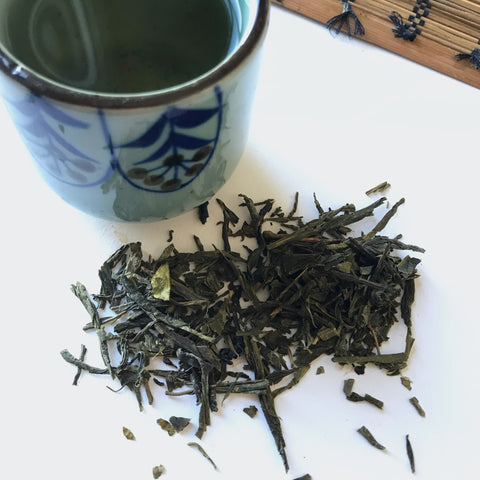What is Green Tea?
Green tea comes from an evergreen bush called Camellia sinensis, as do black and oolong teas, but does not go through the same oxidization process. Since green tea is not oxidized, it is considered to be one of the least processed teas and contains many benefits including high levels of polyphenols and antioxidants. Originating in China, green tea is one of the most popular beverages on the planet. Green tea is still grown extensively in China but it is also grown and produced now throughout southeast Asia, in Japan, and even in some parts of North America.

What are the Benefits of Green Tea?
Green tea has many benefits for humans. Green tea benefits include aiding in weight loss by increasing metabolism, reducing inflammation and inflammatory diseases like arthritis, increasing heart health, increasing focus and cognitive functioning and reducing stress.
Drinking green tea is not only good for you but it is a joyful experience. The act of measuring out the tea, pouring it in to your favourite cup and taking the time to enjoy it can lead to a sense of calm and ease while the delightful grounding fragrance works to alleviate stress.

Does Green Tea Have Caffeine?
Yes, green tea contains caffeine.
How Much Caffeine is there in Green Tea?
Compared to black tea, coffee or energy drinks the amount of caffeine in green tea is minimal. A cup of green tea, depending on type and amount of tea used and brew time, contains approximately 30mg of caffeine. For comparison, a cup of black tea or chai contains approximately 50mg of caffeine and a cup of coffee anywhere between 100mg and 180mg.

What is the Best Way to Brew Green Tea?
Green tea is best prepared using water that is cooler than boiling. The reason for this is that unlike black tea or oolong tea, the leaves are not oxidized; therefore, to retain maximum flavour and health benefits, water that has cooled slightly after boiling is recommended. There are many styles of green tea, but for our Sencha Green Tea and similar green teas we recommend using 1-2 teaspoons of green tea per cup and pouring over with water that has cooled for about 4 minutes after boiling. We recommend steeping green tea for 1-2 minutes.

Why Does Green Tea Become Bitter if you Steep it too Long?
Green tea, and most teas for that matter, will become bitter if you steep them for too long. This is because the tannins of the tea are released at the later stages of the brewing process. For less bitter tea, steep for the recommended steep time. Similarly, green tea will become bitter if the water used is too hot.
Can you Re-Steep Green Tea?
Green tea is one that can be re-steeped and enjoyed 2-3 times! You may find you need to steep a minute or so longer than your first steep.

Can you Compost Green Tea Leaves?
When you have fully used your green tea leaves, place in the compost – organic green tea is a great addition for your garden, as it is still full of goodness that will break down quickly and add nutrition to your garden beds or plant pots!
How to Store Green Tea:
Like all teas, green tea is best stored in an airtight container away from light. We recommend transferring green teas into a stainless steel tin or dark coloured glass container and storing in a dry, cool location away from windows or bright lights. This will maintain optimal freshness, quality and colour.
Our Green Tea:
At Shanti Chai & Co, our favourite green tea and the one we currently offer is Sencha Green Tea. Grown in the Zhejiang Province in Eastern China, this green tea is a lovely smooth cup with an earthiness and subtle notes of grass and seaweed.

Sources:
Medical News Today https://www.medicalnewstoday.com/articles/269538#health-benefits
The Spruce Eats https://www.thespruceeats.com/sencha-765146
Divinity https://www.divinitea.com/how-many-times-can-i-resteep-tea/
